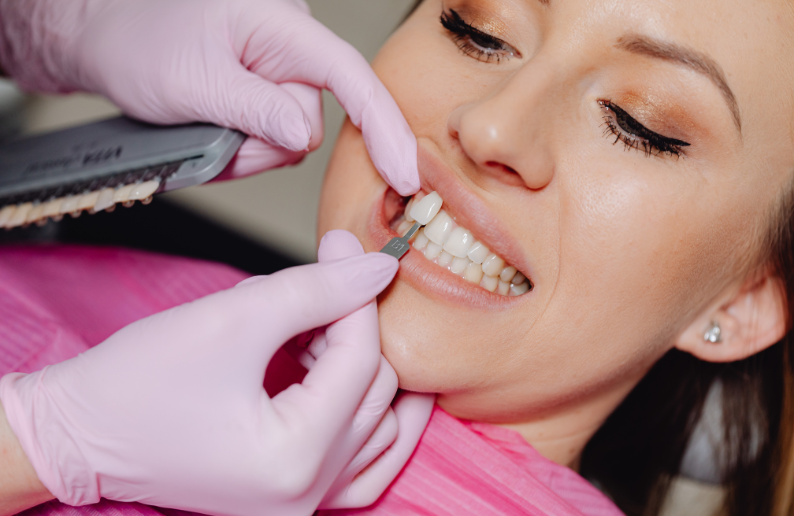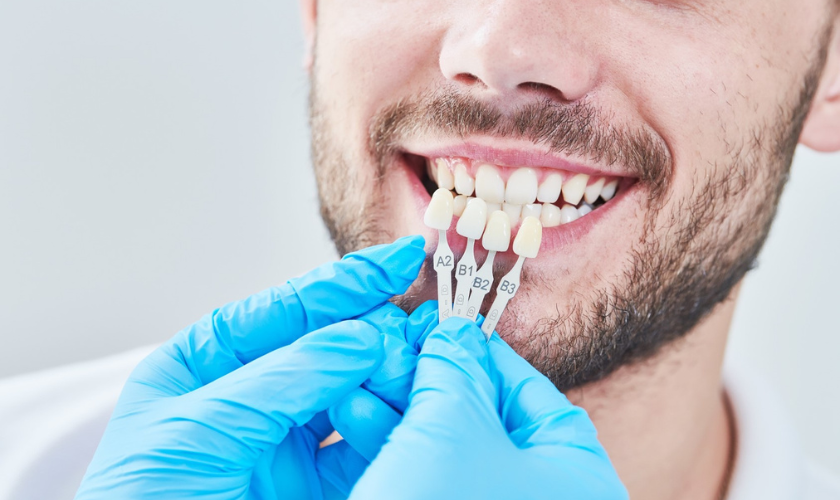New Patients Welcome!

Getting dental veneers is an exciting way to enhance your smile. They can transform the appearance of your teeth, boosting your confidence. However, what happens if you experience severe pain from dental veneers? While some discomfort is expected during recovery, major pain can be a red flag that something isn’t quite right. Let’s dive into why this happens and, more importantly, what you can do about it.
Is Pain Normal After Getting Dental Veneers?
First, it’s essential to recognize that minor discomfort after the procedure is entirely normal. Placing veneers involves some adjustment to your teeth, which can lead to sensitivity. You might feel tenderness around your gums or sensitivity to hot and cold foods, but these symptoms should fade after a few days.
However, major pain that doesn’t subside after a reasonable period may indicate an underlying issue. If the pain persists, it’s time to address it before it worsens.
Possible Causes of Major Pain
There are several reasons why you might be experiencing significant discomfort after getting dental veneers. Understanding these causes can help you take the proper steps toward relief.
1. Tooth Sensitivity
Your dentist needs to remove a small layer of enamel to fit the veneers, which can expose sensitive layers of your teeth. If too much enamel is removed or the veneer is not fitted correctly, this sensitivity can cause ongoing pain.
2. Improper Fit
If the veneers are too thick or don’t align properly with your natural teeth, it can lead to discomfort. An improper fit can affect your bite, causing pain when chewing or speaking.
3. Infection or Inflammation
An infection in the tooth or gum can occur after the procedure if proper hygiene isn’t maintained. Signs of infection include swelling, redness, and throbbing pain. Addressing this quickly is essential, as it can lead to more serious dental issues if left untreated.
4. Nerve Damage
Though rare, improper handling during the procedure can result in nerve damage. This can cause prolonged pain, numbness, or tingling in the affected area. If you notice these symptoms, it’s critical to consult your dentist as soon as possible.
5. Pre-Existing Dental Issues
Sometimes, pain arises from underlying problems that weren’t addressed before the veneers were placed. Issues like tooth decay, gum disease, or cracks in the teeth can exacerbate after the procedure.
Steps to Take if You’re in Pain from Dental Veneers
If you’re experiencing severe pain after getting veneers, there’s no need to panic. You can take several practical steps to alleviate the discomfort and ensure your smile stays healthy.
1. Assess the Severity
Start by evaluating the intensity of your pain. If it’s mild and fading over time, it could just be part of the normal healing process. However, if the pain is severe or worsening, take action immediately.
2. Consult Your Dentist
Your first call should be to your dentist. They’ll need to examine your teeth to identify the source of the problem. They may take X-rays to rule out infections or structural issues. A simple adjustment to the veneer can often resolve the pain.
3. Use Over-the-Counter Pain Relief
Until you can see your dentist, over-the-counter pain medications like ibuprofen can help manage the discomfort. Just be sure to rely on them only with professional advice.
4. Avoid Hot or Cold Foods
To reduce sensitivity, avoid very hot or cold foods and drinks. The temperature can aggravate your pain, especially if the enamel underneath is exposed or the veneers aren’t correctly fitted.
5. Saltwater Rinse
Rinsing your mouth with warm salt water can help reduce inflammation and prevent infection. This simple and effective home remedy can provide temporary relief until you see your dentist.
6. Soft Diet
Switching to a softer diet can reduce the strain on your teeth while you wait for the pain to subside. The rule of thumb is that the list of best foods after oral surgery shouldn’t include anything hard or sticky that requires excessive chewing. It can worsen dental discomfort.
7. Use a Desensitizing Toothpaste
For ongoing sensitivity, a desensitizing toothpaste can be helpful. These products are designed to block the nerve pathways in your teeth, reducing discomfort when eating or drinking.
When to Seek Emergency Help
Not all dental pain is an emergency, but sure signs indicate you need immediate attention. If you experience any of the following symptoms, it’s crucial to seek emergency dental care:
- Severe Swelling or Fever: These can be signs of a severe infection.
- Excessive Bleeding: This could indicate damage to your gums or underlying tissues.
- Unbearable Pain: If over-the-counter medications aren’t helping, it’s time to get urgent help.
- Pus or Foul Smell: This is another sign of infection that needs to be addressed quickly.
Preventing Future Pain
Once the pain is under control, focusing on prevention is essential to avoid future issues. Here are a few tips to keep your veneers and natural teeth in top shape:
- Maintain Good Oral Hygiene: Brush and floss regularly to keep your teeth and gums healthy.
- Visit Your Dentist Regularly: Regular check-ups will allow your dentist to monitor your veneers and catch any issues early.
- Avoid Grinding Your Teeth: If you grind your teeth at night, ask your dentist about a mouthguard. Grinding can cause your veneers to crack or shift, leading to pain.
- Be Mindful of Your Diet: Avoid hard foods that could damage your veneers and lead to discomfort.
Pain from dental veneers can be worrying, but it’s usually a sign that something needs to be adjusted or addressed. The key is to stay calm and take proactive steps to resolve the issue. Consulting with your dentist, following a soft diet, and maintaining good oral hygiene can help you manage your discomfort and enjoy the long-term benefits of your new smile.
If you ever find yourself in major pain after a cosmetic dental procedure, don’t hesitate to act. Quick intervention can make all the difference in preventing further complications and ensuring your veneers stay as dazzling as the day you got them.





